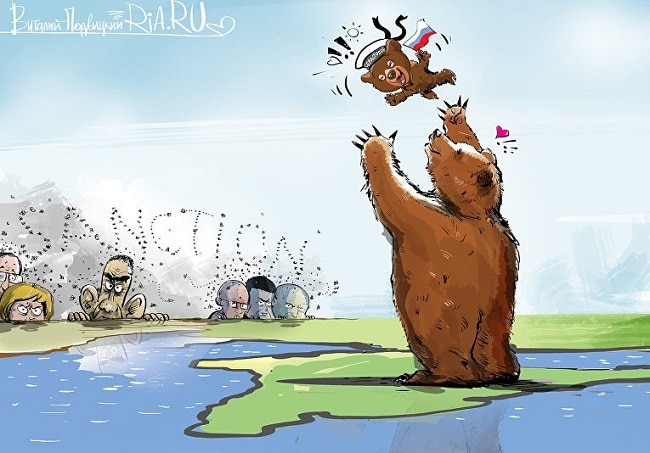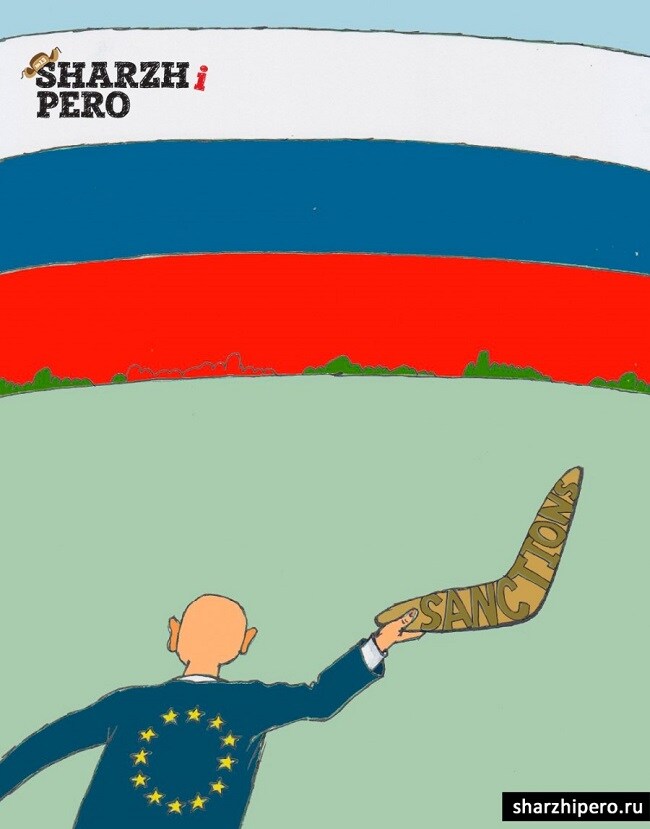The Federation Council's Foreign Affairs Committee chair, Senator Konstantin Kosachev, tells the Russian media outlet Lenta.ru that the European countries are prepared to abandon sanctions against Russia, and their economic interests force them to seriously consider recognizing Crimea as Russian territory.
Below are excerpts of Kosachev's interview:[1]

Senator
Konstantin Kosachev (Source:
Sputniknews.com)
'If We Get Entangled In An Arms Race, It Will Be The Second Edition Of The Cold War'
Q: "What should we expect after the NATO summit...?"[2]
Kosachev: "I have no doubts that NATO is going to introduce additional contingents into the Baltic States and Poland. It is being done in order to justify the existence of this organization. The U.S., the major source of finance for the bloc, realizes that NATO has lost its raison d'être following the USSR's collapse. It is not easy to keep your allies in check all the time, you need an enemy for that; and Russia was the one selected to be that enemy, rather than, say, international terrorism.
"Although the character of the threats changed a long time ago, the U.S. continues to scare NATO members with [the chimera of an] 'aggressive Russia aiming to occupy Poland and the Baltics'. It is hard to keep the Poles and the Baltic peoples in submission [merely] with the threat of a migration crisis or global warming.
"At the same time, NATO, in fact, turns a blind eye to such serious problems as counter-terrorism, the threat of proliferation of mass destruction weapons, migration. It happens because NATO wants to be the only leader, but in order to liquidate terrorism the efforts of all countries are needed, including those outside the bloc."
Q: "In what specific decisions has this [NATO attitude] been reflected recently?"
Kosachev: "For example, because of the disagreements on Ukraine they cancel cooperation with Moscow in all areas, including terrorism. The explanation is simple: figuratively speaking, NATO members want to fly first class themselves (to ensure their own safety), put their allies in business class, and send all the rest to the rear. They refuse to understand that at this moment, a bomb may already be ticking in the hold, which will tear the plane to pieces, no matter who is sitting where.
"They are living under the illusion that they have solved their problems thanks to NATO and nothing threatens them now. An absolutely irresponsible position!
"For example, any disagreements with Russia about Ukraine will seem so trivial if terrorists, God forbid, seize power in a country that possesses weapons of mass destruction. Unfortunately, such a situation is easily imaginable, if you look at Pakistan, neighboring the unstable Afghanistan and possessing nuclear weapons. This scenario is a nightmare for the entire world. In order to avoid it, we must cooperate with each other, first, on issues of counter-terrorism, and secondly, on a nuclear weapons non-proliferation regime. But so far, this is not happening."
Q: "In case NATO gets more active in the Baltic States, what can Russia do?"
Kosachev: "On the political level, we are trying to meet the aggressive actions of NATO in the Baltic region with offers of constructive cooperation. If we get entangled in an arms race, it will be the second edition of the Cold War. I am not sure that we will survive it a second time.
"We must not give up or give in to despair; we must keep looking for points and ideas that would be interesting, including for our potential partners in NATO..."
'The Bigger The Breach In Relations Between Kiev And Moscow, The More The West Is Responsible For The Situation In Ukraine'

Despite the
West's push for sanctions, Mother Russia cuddles her cub, Crimea. (Source: Vitaly
Podvitsky, Ria.ru, March 16, 2016)
Q: "Do you have a feeling that Europe is moving in a different direction than the U.S. with regards to Crimea? Several Italian regions simultaneously adopted resolutions calling for the removal of sanctions and recognition of Crimea. Are things really underway?"
Kosachev: "The situation with Crimea is dynamic. I want to emphasize that the external pressure on Russia is now mostly applied in connection with the south-east of Ukraine. Crimea has taken a back seat, and the West now connects the lifting of sanctions exclusively with the implementation of the Minsk agreements. But it does not mean that when the terms of the agreements are implemented, the Europeans won't backtrack on the issue of Crimea. This means that change in any direction is possible."
Q: "Then what motivates the Italians in this way?"
Kosachev: "If we speak about the latest steps by regional parliaments in Italy [adopting resolutions on recognizing the status of Crimea - Lenta.ru addition],[3] here we can see an economic influence, to a large extent: the more developed industrial regions in the north of Italy sustain losses due to the sanctions. And Italians realize that if sanctions depend on Crimea, it will be a never-ending story. Because, the issue of Crimea is closed, in contrast with the Donbass [in Ukraine]. The Crimeans have made a clear choice. Now all that remains for us is to hope for the common sense of the Western politicians."

Sanctions have a boomerang effect on the EU. (Source: Sharzhipero.ru)
Q: "That mean, a chance still exists that Crimea will be recognized as Russian?"
Kosachev: "Let us recall - when it started it was out of control, but currently many politicians, with the exception of terminal Russophobes, see the situation differently. The status of Crimea, in my opinion, has every chance to be accepted by the international community. Look what has happened with North Cyprus: even though a military occupation indeed occurred there, the situation with this controversial territory does not affect Turkey's international relations. I think that it will develop in a similar way with Crimea sooner or later. But that's the very least. We, of course, will strive towards full-fledged recognition of Crimea's new status as an integral part of Russian Federation."
Q: "Don't you think that Europe is beginning to tire of Ukraine? There are proposals to impose sanctions on Kiev as well."
Kosachev: "Yes. There is a feeling that the West is gradually coming to realize the mistake of imposing responsibility for compliance with the Minsk agreements on Russia alone. It's a loophole as far as their implementation is concerned, and the Ukrainians are happy to use it. I will explain why. It is in the interests of the West that the Minsk agreements be implemented, and the sanctions lifted from Russia. Russia's interests are ultimately the same.
"But Ukraine takes a different view of events. It appears to want the implementation of the agreements; it wants the south-east to return to the unified Ukrainian state. But at the same time it is interested in having anti-Russian sanctions maintained interminably. To Ukraine, compliance with the Minsk agreements and removal of sanctions, on the one hand, and non-compliance and renewal of sanctions, on the other, both have their pros and cons. That's why it can play this game for a long time, disregarding the fact that people continue to suffer and die as a result.
"At the same time, the situation in Ukraine is deteriorating. Under the current regime, Ukraine hasn't been able to demonstrate any tangible achievements either in politics, the economy, or the social sphere. Its only real achievement, from the point of view of the Western countries supporting Ukraine, is its progress in anti-Russian rhetoric. But the bigger the breach in relations between Kiev and Moscow, the more the West is responsible for the situation in Ukraine, including financial responsibility. And the West is beginning to understand this. Better late than never..."
Endnotes:
[1] Lenta.ru, July 12, 2016.
[2] See MEMRI No. 6522, Following The NATO Summit In Warsaw July 8-9 And Ahead Of The NATO-Russia Council Meeting On July 13 - An Interim Review, July 13, 2016
[3] The Regional Councils of three Italian Regions, Veneto, Liguria and Lombardy have passed resolutions supporting the recognition of Crimea as an integral part of the Russian Federation. They also demand the immediate lifting of sanctions against Russia. These resolutions, supported by the Italian Euroskeptic party Lega Nord and center-right parties, will have no immediate practical consequences, as regions have no legal say on the country's foreign policy. However they constitute a symbolic political act that will pressure the central government to soften the hard stance adopted by the European Union and the United States with regards to Russia's annexation of Crimea.
Veneto was the first region to pass this resolution on May 18. Veneto Regional Counselor Stefano Valdegamberi, who sponsored the initiative in Veneto, explained the motivations:
"We want to unequivocally recognize the right of the people of Crimea to decide on their own destiny, since the people of Crimea want to stay with Russia, and we also want our relations with Russia to be restored. Obviously, this has no [immediate] consequences on foreign policy; however it conveys a wish, since Veneto is suffering as a result of wrong European policies." The resolution enjoins the region's president to open a dialogue with the central Italian authorities and with the European Union in order to revise European policies towards Russia."
On June 7, Liguria passed its own resolution whereas Lombardy followed suit on July 5. The resolution presented by the Lombardy Region in particular emphasized the necessity of Russian partnership in the fight against international terrorism and the need to offset the damages sustained by Italy due to the anti-Russian sanctions. Italy, as a whole, sustained damages of 3.6 billion Euros, while the country's industrial powerhouse of Lombardy alone bore 1.8 billion Euros in damages. Ilgiornale.it, May 18, 2016; Genova24.it, June 29, 2016; Ilgiorno.it, July 5, 2016.





